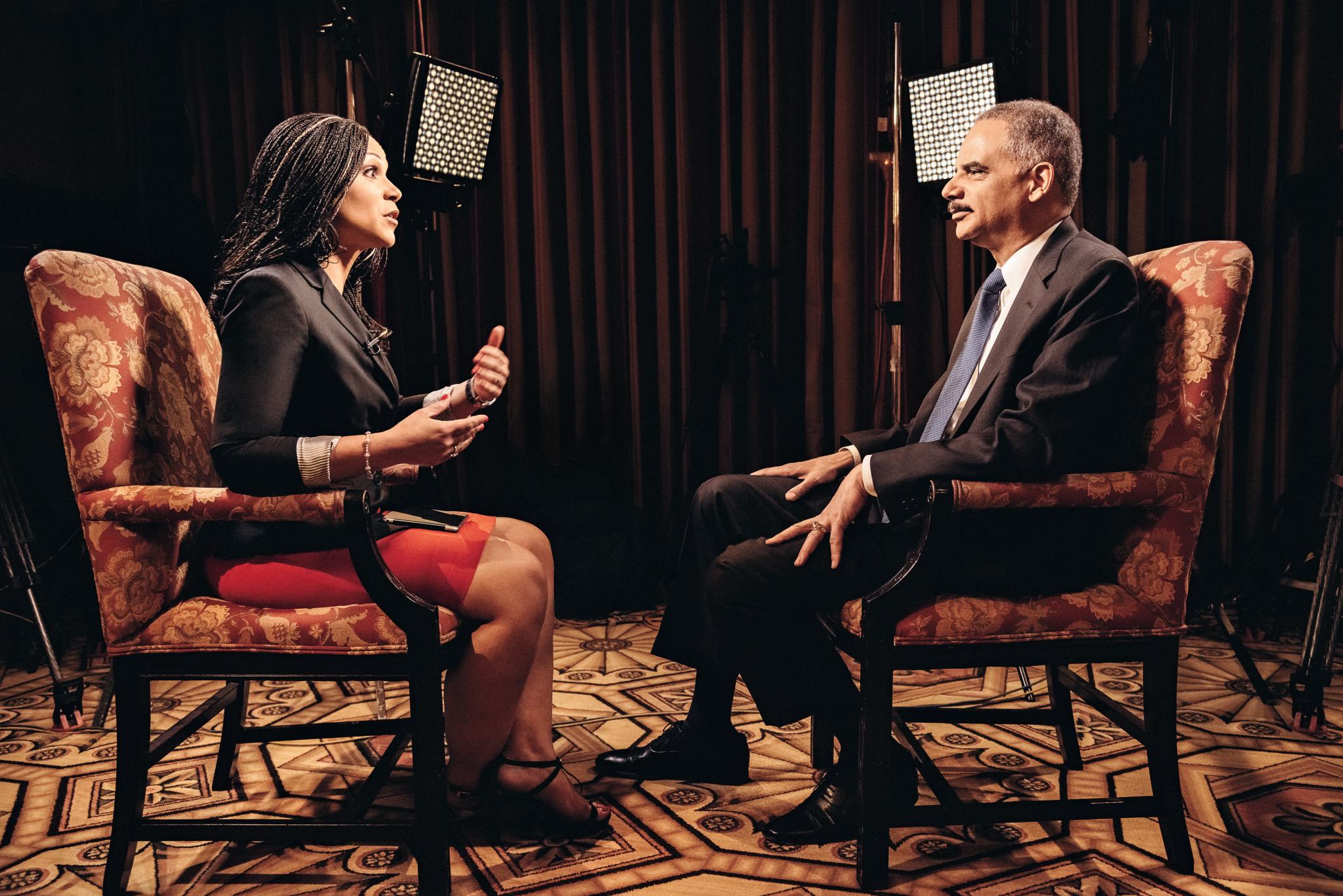
Melissa Harris Perry reflects on our first Black Attorney General’s tenure.
I was wrong about Eric Holder. In February 2009, the new attorney general characterized America as a “nation of cowards” for failing to discuss race forth-rightly. In response I wrote, “I don’t want my attorney general to scold me about having conversations; I want him to tell me the lawsuits he plans to file against those who continue to practice educational, employment and housing discrimination.… The time for talking may come, but today is a day for action.” I suspected that Holder’s early emphasis on interracial dialogue signaled a reticence to use the power of the Department of Justice to address deeply embedded racial inequalities. I was wrong. Attorney General Eric Holder’s tenure was consequential precisely because of his unflinching pursuit of structural justice.
The fact that I underestimated him six years ago made it even more illuminating to sit down with the outgoing attorney general this past February as he reflected on the battles that marked his service in the Obama administration.
Steadfast support of LGBT equality is a core aspect of Holder’s civil rights legacy; it was his decision to cease defending the Clinton-era Defense of Marriage Act. That move generated unprecedented momentum for same-sex marriage advocates, and within a few years the country shifted dramatically toward marriage equality.
While Holder’s DOJ has been criticized by some for its refusal to bring criminal charges against individual bankers implicated in the 2008 economic crash, his department has a track record of important—if lesser-known—economic justice prosecutions. It won historic settlements against banks that employed predatory lending in credit cards and car and home sales. It also ended the practice of unfair police seizure of personal property. These victories have had direct and meaningful impact on African-American communities and their ability to acquire and protect Black wealth.
But nothing will more fully define Holder as America’s top law enforcement agent than criminal justice reform. He spearheaded the policy changes that reduced the crack versus powder cocaine disparity; he instituted additional leniency for low-level drug offenses and he called for repeal of felon disfranchisement. History will likely remember these amendments as agents that pushed the unraveling of mass incarceration—an epidemic characterized by scholar Michelle Alexander as The New Jim Crow.
Still, it is Holder’s response to the televised horrors of police actions in Ferguson, Missouri, that stands as the final test of his deftness and courage in deploying the power of his office. The DOJ’s blistering report detailing the endemic racial practices of Ferguson officials had its genesis in Holder’s personal visit to the city in crisis. During our interview, Holder remarked, “I’m not ever going to forget the day that I spent interacting with the citizens of Ferguson, and the consistency in the concerns that they expressed, and their real desire for change and desire to be treated simply as American citizens. And that has really stayed with me. So my hope is that on my watch I’ll get to announce what the Justice Department intends to do.”
On March 4, 2015, Holder did just that. He stood before television cameras and said of Ferguson, “Some of those protestors were right.” Despite finding insufficient evidence to bring individual charges against officer Darren Wilson in the killing of Michael Brown, Holder outlined what he described as a “searing” report that documented embedded practices of racial discrimination that personally and economically terrorized the very community Ferguson police were charged to protect. Holder demanded immediate and sweeping change to address racial bias.
In his first days as attorney general, Holder called for greater courage from our nation. Despite a deeply dysfunctional relationship with Congress, biting criticism from some progressive quarters about his management of torture justifications, uncooperative Wall Street bankers and the often unforgiving media, he never wavered from this conviction. In the end, Holder was committed to using the power of his office, even when it was profoundly constrained, to produce a more just nation. Thank goodness I was wrong about him.
Melissa Harris-Perry is a contributing writer for ESSENCE.
This article originally appeared in the May 2015 issue of ESSENCE magazine, on newsstands now.